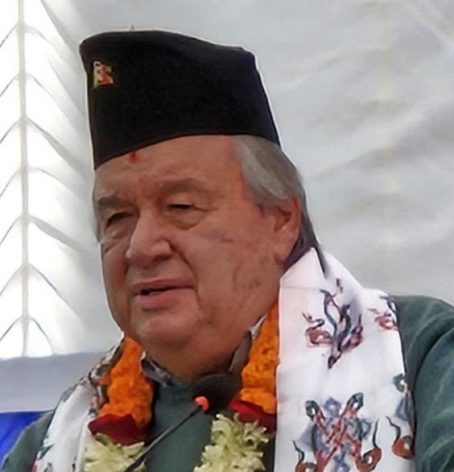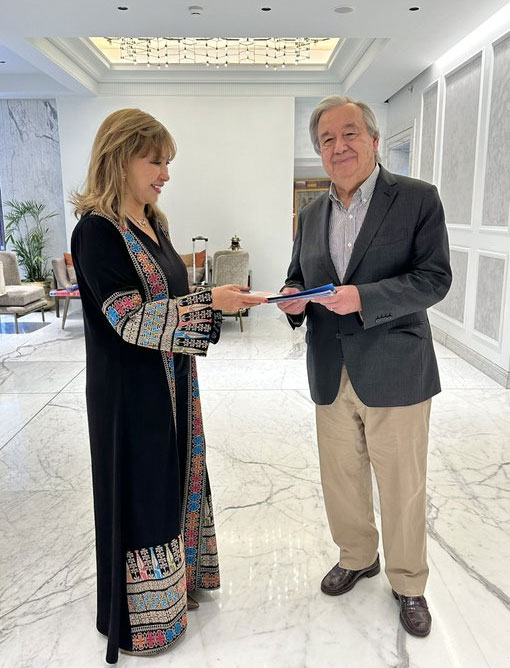António Guterres in Nepal: Transitional Justice to the Fore

KATHMANDU, Nepal, Nov 02 (IPS) - Many observers found it intriguing that UN Secretary-General António Guterres would want to spend three full days in Nepal even as Israel was carpet-bombing Gaza.
He did speak out from the Security Council floor, for which he was rewarded with a demand for resignation by the Israeli ambassador, but there was obviously much more to be done against the ongoing mass-murder of Palestinians.
A Nepali commentator asked on Twitter, “Is this the time for UN Sec Gen to be anywhere other than the Middle East?”
Perhaps it was the prospect of visiting Lumbini, birthplace of Sakyamuni Siddhartha Gautam – the Buddha, Asia’s ‘prince of peace’ – that brought Mr. Guterres to Nepal. He did use his time at the nativity site, which has been visited by all five Secretaries-General since Dag Hammarskjold in 1959, to highlight urgency of world peace.
The Secretary-General might also have wanted to laud Nepal’s role as the second-largest contributor to UN peacekeeping operations, a position it holds despite being kept off the command responsibilities it deserves.

But there were two issues besides world peace that Mr. Guterres clearly wanted to highlight: the transforming world climate and Nepal as a path-breaker in arena of transitional justice.
In separate helicopter trips to the base of Mount Everest and to the Annapurna Sanctuary, the Secretary-General relied on the experience of the mountain people to sound the alarm on climate crisis, three weeks before COP-28 is to start in Dubai. The highly populated ‘third pole’ of the planet indeed serves as a barometer of global warming, and the receding glaciers of an inhabited Himalaya are a more potent bellwether of climate catastrophe than the Arctic or Antarctica.
Joint Session of Parliament
For Nepal, the most significant aspect of the Secretary-General’s visit was the suspended transitional justice (TJ) process, which began with the end of the decade-long Maoist insurgency in 2006.
The matter languishes even though the Maoists rebels have long since joined mainstream politics and commandant of the Maoist force is presently the prime minister. He is in that position despite holding no more than 11 percent of seats in Parliament, but that is another story.
Prime Minister Pushpa Kamal Dahal (nom de guerre: ‘Prachanda’) had hoped to use the Secretary-General’s trip to show off his international standing to the Nepali populace, and to get a green signal from the Secretary-General for his tendentious plans to push a perpetrator-friendly TJ draft law through Parliament.
Despite an overwhelming show of obsequiousness from Mr. Dahal who followed him at practically every step around the country, the Secretary-General did not oblige his host. Instead, Mr. Guterres used every pulpit during his trip to insist that Nepal’s TJ process be concluded within three parameters: a) concurrence of the victims of conflict; b) concordance with relevant international law and principles; and, c) follow the precedence-setting judgements on transitional justice by the Supreme Court of Nepal.
While the victims of Nepal’s conflict did not get to meet the Secretary-General, as requested, their various submissions were put together in a file and presented to Mr. Guterres as he departed for the airport on the morning of 11 October by Hanaa Singer-Hamdy, the UN Resident Coordinator to Nepal. She said in her comment on X (Twitter): “The needs and priorities of the conflict victims are at the heart of Transitional Justice-related discussion in Nepal.”
Making of An Exemplary Process
The Secretary-General clearly understands that, worldwide, the fraught arena of transitional justice has had too few successes, whereas it provides the pathway for post-conflict societies to heal and recover – through reparation, memorialisation, truth and reconciliation, not to forget accountability for extreme cases of human rights abuse.
Herein lies the importance of Nepal, where the Nepali-led transitional justice process is presently stuck, but the victims and rights defenders have not let go. The international community, and especially the United Nations, can help by ensuring that there is principled monitoring.
That the Nepalis players are capable of moving the boat to the other shore was what Mr. Guterres emphasised in his address on 10 October to a joint session of Parliament.
Nepal’s transitional justice process could become an example for post-conflict societies the way Colombia, South Africa and Sierra Leone are today held out for their relative success. Within South Asia, a region awash in long-term conflict from Kashmir to Sri Lanka, Afghanistan and Balochistan to the Arakan, transitional justice is not ‘deployed’ anywhere else other than in Nepal.
All the more reason for the Nepali process to succeed in order to provide a model for the rest of the region to consider, and for Mr. Guterres to dwell on the matter during his visit.
Ironically, the main roadblock to a proper conclusion of the peace process was the Secretary-General’s host, the prime minister. While the Mr. Dahal used the conflict and the ensuing peace process to build his personal political career, he understands that a genuine transitional justice exercise would jeapordise his trajectory and pre-eminent position in Nepali politics.
The entire superstructure of his Maoist party would collapse were he to submit his colleagues to an accountability process, even if only ‘emblematic cases’ were to be investigated. Hence, the formula used on the TJ over a decade and more has been prevarication and duplicity.
The government security personnel who would have been involved in atrocities during the conflict of 1995-2006 are all retired by now, whereas the Maoist leadership is today part of Nepal’s political establishment, ruling the roost.
They are loathe to be held accountable, which is why their supremo Mr. Dahal cannot countenance an honest exercise, and which is why he was hoping to bamboozle Mr. Guterres with pomp and flattery.
Victims and Spoilers
While there has historically been ferocious bloodletting in the Kathmandu Court among clans and factions vying for power, the villages of Nepal have been largely free of internecine violence until the decade of insurgency and state response.
The villagers of Nepal were caught in a pincer between the Maoist rebels who specialised in hit-and-run raids and the security forces that meted out harsh treatment to local level political leaders, teachers and development workers.
The role of Mr. Dahal himself may be held up for scrutiny in a genuine Truth and Reconciliation process, for he headed the chain of command of the Maoist insurgents. His attitude to atrocities including murder, torture, rape and abduction conducted by his cadre has always been ambiguous, and there has been no expression of remorse throughout his years in open politics.
If anything, there has been gleeful celebration of extra-judicial killing and physical violence generally, and he has even expressed satisfaction on how he personally fooled the United Nations Mission in Nepal (UNMIN) into tripling the number of Maoist combatants in a verification exercise.
In 2007, upon coming above ground, Mr. Dahal told a BBC interlocutor that in a personal circular during the conflict, he had instructed that “you may eliminate individual if required, but without torture”. Over the years, Mr. Dahal has been the key leader who ensured that successive Truth and Reconciliation Commissions were designed for failure, with their membership padded with Maoists.
Most recently, Mr. Dahal’s attempt has been to push through legislation that would make it easy for the next Truth and Reconciliation to let perpetrators (of both sides, rebels and state security) off the hook by, among other things, creating two categories of murder: ‘normal murder’ and ‘extreme murder’.
What makes the Secretary-General’s interest on Nepal’s transitional justice efforts vitally important is that the Western governments and INGOs who introduced the concept and funded the Nepal’s engagement with TJ are now losing interest. This seems to have to do with ‘TJ fatigue’, a paucity of funding, as well as certain geopolitical considerations.
Some Western policy-makers see Mr. Dahal as a pliable head-of-government of a strategically important Asian country who they must have ‘on their side’ as China proceeds with a more aggressive continental policy of its own.
Nepal’s victims of conflict, in coordination with human rights defenders, have been fighting a lonely battle against a political class and polity that has been in thrall of the Maoists’ momentum and their attempt to create a ‘new normal’ in the polity, with a forced attempt to ensure past atrocities are forgotten.
Whereas, the victims of conflict are united in not letting the perpetrators get the better of memory. The UN Secretary-General has come up with a powerful position of support for a transitional justice process that is just and humane, and the victim representatives and rights defenders of Kathmandu are heartened. Their worst fears that bubbled to the surface when the Secretary-General’s visit was hurriedly announced were not borne out.
What is required now is to keep watch for ‘spoilers’ of the peace process, and they include many influential Nepalis who have over the past decade developed political and inter-personal relationships with the perpetrators of the conflict years.
Likewise, there is a Western diplomat (or two) who seem to have a low opinion of the Nepali yearnings for a just peace, rather than the peace of the cemetery.
A group of civil society actors cautioned the Secretary-General in a letter delivered as he departed Kathmandu: “There are national and international ‘spoilers’ wanting to foist a perpetrator-friendly ending to the peace process in the name of elapsed time and geopolitical expediency.”
Kathmandu-based writer and journalist Kanak Mani Dixit is founder-editor of the magazine Himal Southasian, and was a UN Secretariat staffer from 1982-1990.
IPS UN Bureau
Follow @IPSNewsUNBureau
Follow IPS News UN Bureau on Instagram
© Inter Press Service (2023) — All Rights Reserved. Original source: Inter Press Service
 Global Issues
Global Issues